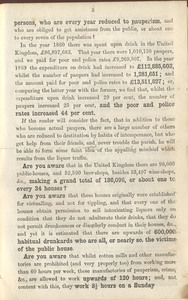UK Alliance, The (1871) The Licensing Bill and the Liquor Traffic: Facts for the People p3. [Image]
![Facts for the People (Stats) p3of4 001.jpg [thumbnail of Facts for the People (Stats) p3of4 001.jpg]](https://clok.uclan.ac.uk/48788/1.hassmallThumbnailVersion/Facts%20for%20the%20People%20%28Stats%29%20p3of4%20001.jpg)  Preview |
Image (JPEG)
- Published Version
Available under License Creative Commons Attribution Non-commercial Share Alike. 508kB |
Official URL: https://www.uclan.ac.uk/about-us/special-collectio...
Abstract
This tract, produced in Manchester by the UK Alliance, sought to highlight the issues around the prospective Licensing Bill. The Alliance was founded in 1853 to press for legislative reform.
persons, who are every year reduced to pauperism, and who are obliged to get assistance from the public, or about one to every seven of the population?
In the year 1860 there was spent upon drink in the United Kingdom £86,897,683. That year there were 1,010,158 paupers, and we paid for poor and police rates £9,269,807. In the year 1869 the expenditure on drink had increased to £112,885,603, whilst the number of paupers had increased to 1,281,651; and the amount paid for poor and police rates to £13,511,827; or, comparing the latter year with the former, we find that, whilst the expenditure upon drink increased 29 per cent, the number of paupers increased 25 per cent, and the poor and police rates increased 44 per cent.
If the reader will consider the fact, that in addition to those who become actual paupers, there are a large number of others who are reduced to destitution by habits of intemperance, but who get help from their friends, and never trouble the parish, he will be able to form some faint idea of the appalling mischief which results from the liquor traffic.
Are you aware that in the United Kingdom there are 98,009 public-houses, and 52,590 beer-shops, besides 35,497 wine-shops, &c., making a grand total of 186,096 or about one to every 34 houses?
Are you aware that these houses originally were established for victualling, and not for tippling, and that every one of the houses obtain permission to sell intoxicating liquors only on condition that they do not adulterate their drinks, that they do not permit drunkenness or disorderly conduct in their houses, &c., and yet it is estimated that there are upwards of 600,000 habitual drunkards who are all, or nearly so, the victims of the public house.
Are you aware that whilst cotton mills and other manufactories are prohibited (and very properly too) from working more than 60 hours per week, these manufactories of pauperism, crime, &c., are allowed to work upwards of 120 hours; and, not content with this, they would 8 ½ hours on a Sunday
Repository Staff Only: item control page

 Lists
Lists Lists
Lists
